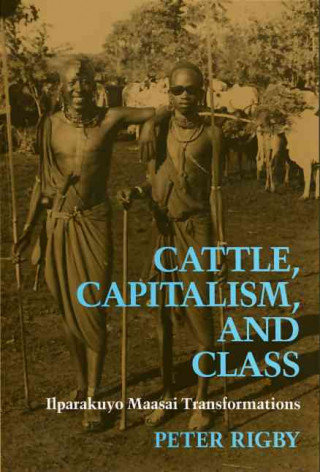
Kód: 11563070
Cattle, Capitalism, Class
Autor Peter Rigby
Focusing on the Ilparakuyo Maasai of Kenya and Tanzania, Peter Rigby discusses why third world development policies with regard to pastoral societies are inappropriate and likely to fail. A political economy of development, mainta ... celý popis
- Jazyk:
 Angličtina
Angličtina - Vazba: Pevná
- Počet stran: 247
Nakladatelství: Temple Univ Pr, 1992
- Více informací o knize

Mohlo by se vám také líbit
-

Dune
200 Kč -

Haunting Adeline
617 Kč -

Berserk Deluxe Volume 2
1050 Kč -

White Nights
90 Kč -

Powerless
276 Kč -

Atomic Habits
340 Kč -

Dune Messiah
178 Kč -

Berserk Deluxe Volume 3
1138 Kč -

One Day
276 Kč -

Berserk Deluxe Volume 1
1033 Kč -

Iron Flame
353 Kč -

Surrounded by Idiots
256 Kč -

Harry Potter and the Prisoner of Azkaban (Minalima Edition)
673 Kč -

Gravity Falls Journal 3
440 Kč -

Heaven Official's Blessing: Tian Guan Ci Fu (Novel) Vol. 1
426 Kč -

The Creative Act
586 Kč -

Dune
214 Kč -

Hunting Adeline
633 Kč -

A Little Life
276 Kč -

Children of Dune
174 Kč -

Heaven Official's Blessing: Tian Guan Ci Fu (Novel) Vol. 2
441 Kč
Dárkový poukaz: Radost zaručena
- Darujte poukaz v libovolné hodnotě a my se postaráme o zbytek.
- Poukaz se vztahuje na celou naši nabídku.
- Elektronický poukaz vytisknete z e-mailu a můžete ihned darovat.
- Platnost poukazu je 12 měsíců od data vystavení.
Informovat o naskladnění knihy
Zadejte do formuláře e-mailovou adresu a jakmile knihu naskladníme, zašleme vám o tom zprávu. Pohlídáme vše za vás.
Více informací o knize Cattle, Capitalism, Class
Nákupem získáte 208 bodů
 Anotace knihy
Anotace knihy
Focusing on the Ilparakuyo Maasai of Kenya and Tanzania, Peter Rigby discusses why third world development policies with regard to pastoral societies are inappropriate and likely to fail. A political economy of development, maintains Rigby, must incorporate historical, cultural, linguistic, and even aesthetic dimensions of the peoples involved. Using ethnography and other research materials, the author illuminates the culture and explores the prospects of a distinct section of pastoral Maasai (the Ilparakuyo). In addition, he attempts to develop a historical materialist theory of language in relation to a specific East African culture. While rural development is a priority in many recently independent third world countries, it is often not designed for the benefit of the producer, as when food products are exported rather than used for domestic consumption. Although much information is available about pastoral societies - herd size, grazing areas, livestock holdings between families - the cultures, languages, and aspirations of such societies are often overlooked by development planners. Rigby describes how government expectations should be based on such social conditions. Adopting an African perspective derived from a dialogue with African philosophical discourse, Rigby analyzes the language customs of the people he lived with to chronicle the changes forced upon the Maasai by both colonial and post-colonial governments. The book features more than a dozen photos that portray a juxtaposition of tradition and modern development in local communities. The Maasai have been victims of land expropriation, unnatural division by international boundaries, forcible interference with theircustoms and rituals, and marginalization by developing governments. Despite this incessant onslaught and the formation of classes in a hitherto classless society, the Maasai have managed to a great degree to preserve their culture and way of thinking. Rigby urges a revolution in
 Parametry knihy
Parametry knihy
2078 Kč
- Plný název: Cattle, Capitalism, Class
- Autor: Peter Rigby
- Jazyk:
 Angličtina
Angličtina - Vazba: Pevná
- Počet stran: 247
- EAN: 9780877229544
- ISBN: 0877229546
- ID: 11563070
- Nakladatelství: Temple Univ Pr
- Hmotnost: 608 g
- Rozměry: 237 × 159 × 23 mm
- Datum vydání: August 1992
Osobní odběr Praha, Brno a 12903 dalších
Copyright ©2008-24 nejlevnejsi-knihy.cz Všechna práva vyhrazenaSoukromíCookies



 Vrácení do měsíce
Vrácení do měsíce 571 999 099 (8-15.30h)
571 999 099 (8-15.30h)